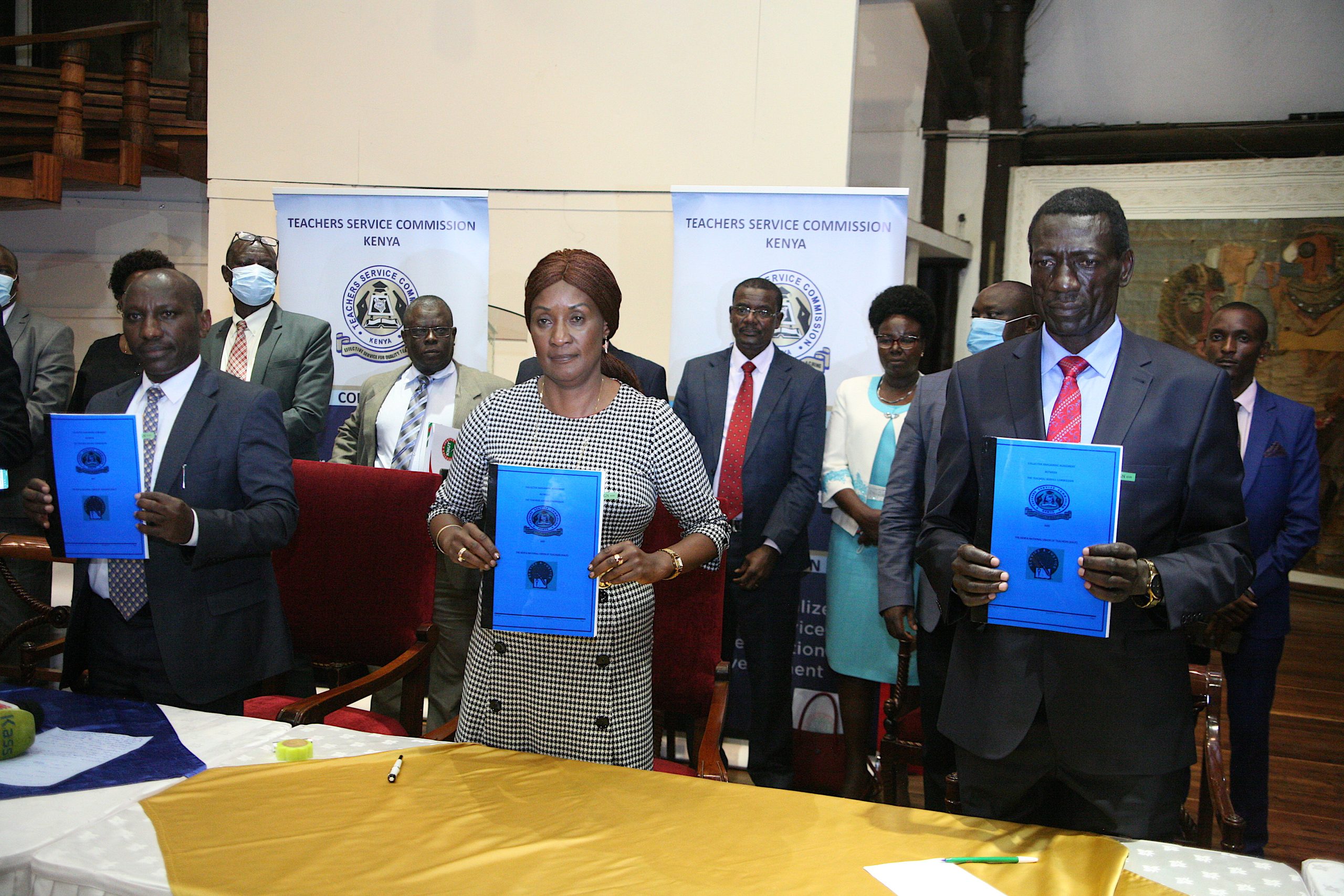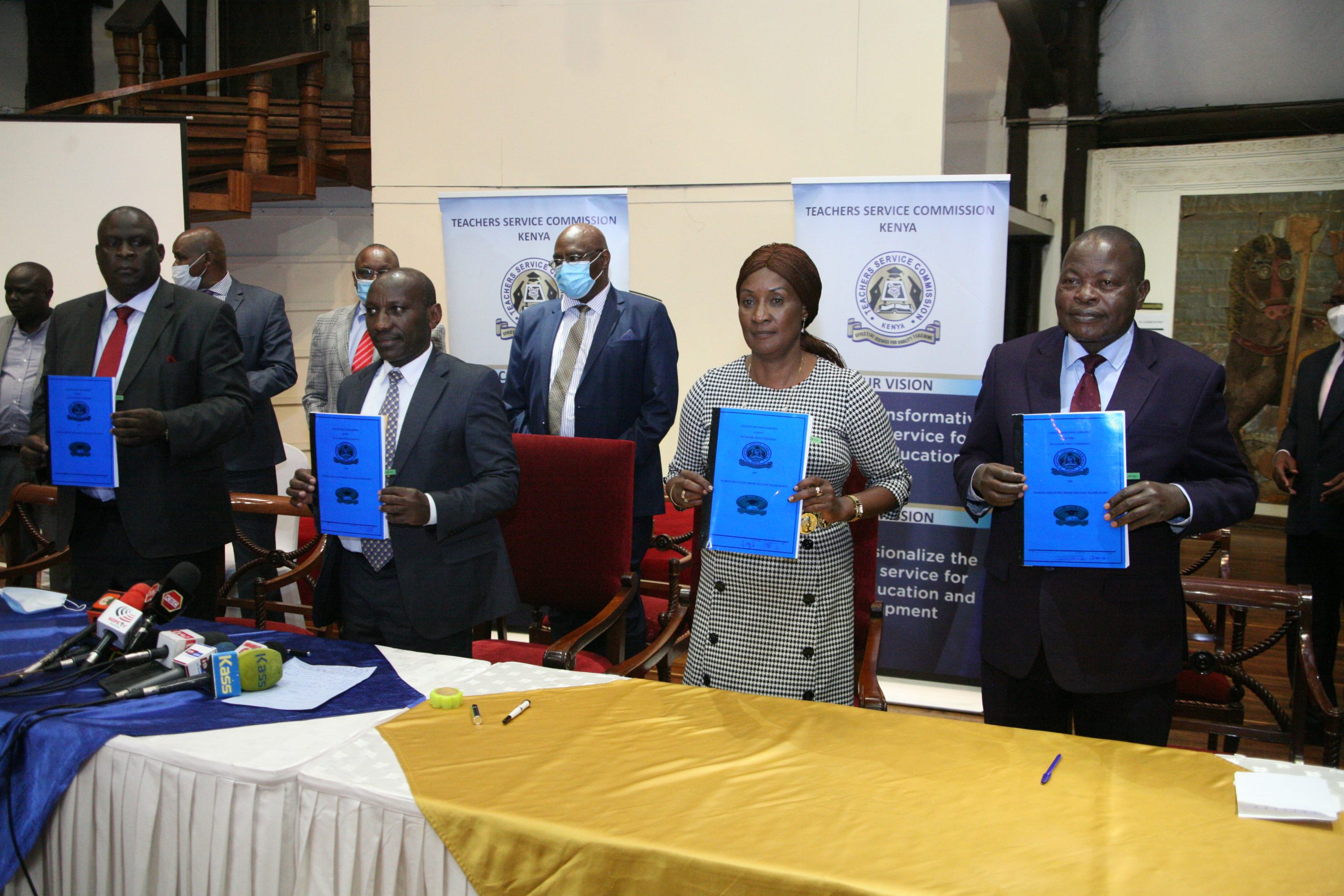The Teachers Service Commission (TSC) will soon begin the process of identifying the new Commission Secretary and Chief Executive Officer (CEO) after the term of the current boss Dr. Nancy Macharia is expected to end in June this year.
According to Section 16 (1) of the TSC Act 2012, the next TSC CEO will be appointed through a competitive selection process: “The appointment of the Secretary to the Commission under Article 250 (12) of the Constitution shall be through a competitive recruitment process,” reads the Act in part.
Although the Act hasn’t clearly stated the number of days the Commission should take to advertise the vacancy or list step by step on how to appoint the next CEO, what is clear however, is that by July 1, 2025 there must be a substantive appointment to the position. From that date Dr. Macharia will not be allowed to transact any business of the TSC owing to the expiry of her tenure.
This therefore implies that between now and June 30, 2025, the Commission which is made up 8 Commissioners and a Chairperson (Dr. Jamleck Muturi John) bringing a total of 9 members, is supposed to ensure that it starts the process of recruiting a new CEO to avoid a vacuum occurring in that position.

The process might take close to two to three months assuming that it starts in April this year, since it will require the position be advertised and give interested candidates time to apply. Then, the shortlisting process, interviews, and finally the picking of the best candidate who will be appointed as the CEO.
Who will be next TSC boss?
On the other hand, legal minds say however, it is not a must as per the law for Dr. Macharia to proceed for terminal leave since the question of such a leave is an administrative issue which should be decided by TSC Commissioners. She still remains as the TSC Secretary/CEO until the last day in office when the next person will be appointed for a seamless transition.
However, it has been established that Dr. Macharia will be proceeding for terminal leave from April this year for the next three months, during which period the Commissioners will identify a suitable candidate to replace her.
The position is sure to attract a lot of interest from top educationists including Principals of schools, senior officers from various State Agencies under the Ministry of Education as well as top officers at the Ministry with a track record of good performance.
ALSO READ:
Governor Achani urges parents to instill religious values in children to curb youth crime
Education News is however learning that the Commissioners may favor an insider for the job rather than an external candidate.
Considering the massive clout and influence the TSC carries given that it is the biggest single employer in the East African region, the position is sure to attract a huge attention from the country’s power brokers who may want to throw their weight into the process, thus interfering with the choice of the board (Commissioners).
Some other quarters were in early February indicating that President William Ruto may choose to name one of the candidates who were shortlisted by the Public Service Commission (PSC) and submitted to his office for the position of Permanent Secretaries (PS). The TSC CEO position is after all at the level of a PS.
As it has been witnessed before, the president as the appointing authority in the country can choose to propose his favorite candidate to the Commissioners for consideration. Under such circumstances, the President’s say will likely carry the day.
The TSC Act 2012 stipulates that a person who should be appointed as the Commission Secretary/CEO should be a citizen of Kenya, holds a degree in education from a recognized university; has had at least 10 years’ experience in education, administration and management, public administration, human resource or financial management; and meets the requirements of Chapter Six of the Constitution.
The Act states further that the person appointed shall be a State officer who shall hold office for a term of 5 years but shall be eligible for re-appointment for one further term of five years.
It further states under Section 17 that the Secretary may only be removed from office by the Commission, in accordance with the terms and conditions of service, for inability to perform the functions of the office arising out of physical or mental infirmity, gross misconduct or misbehavior; incompetence or neglect of duty, a violation of the Constitution; or any other ground that would justify removal from office under the terms and conditions of service.
However, before such a person is removed from office, he/ she shall be given sufficient notice of the allegations made against him or her, and an opportunity to present his or her case against the allegations, either in person or by a legal representative.
The TSC Secretary/CEO is always the head of the secretariat, the accounting officer of the Commission, the custodian of all records of the Commission, and responsible for executing decisions of the Commission, assigning duties and supervising the staff of the Commission, facilitating, coordinating and ensuring the execution of the Commission’s mandate among other duties.
Dr. Macharia’s 10 years reign
Her departure marks the end of an era that has elicited diverse reactions from education stakeholders.
A section of education professionals and teachers acknowledge her achievements in transforming teacher management in Kenya, while others express concerns over policies introduced during her tenure.
Some teachers and stakeholders praise her leadership for spearheading employment initiatives, implementing two Collective Bargaining Agreements (CBAs), and driving digital transformation within the Commission. At the same time, others feel that some of her policies were not adequately inclusive or consultative.
During her tenure, Dr. Macharia oversaw the recruitment of over 100,000 teachers, completion of two CBAs, and significant reforms in the education sector. She also holds the distinction of being the first woman to serve as TSC Secretary and CEO.
Known for her disciplined approach, she maintained firm control over the Commission’s operations, ensuring that her directives were implemented effectively. Her leadership style, while praised for its efficiency, also faced criticism from those who felt it was too rigid.
Dr. Macharia took over from Gabriel Lengoiboni, who retired in 2015, after a competitive selection process that saw her appointment extended for a second five-year term in 2020.
Her rise to the top of TSC followed a career spanning over three decades in the education sector. She started as an assistant teacher before moving up the ranks, eventually becoming Deputy Principal at Kianderi Girls’ Secondary School in Murang’a County.
She holds a Doctorate in Education, a Master’s in Education (Policy and Management) from Bristol University in the UK, and a Bachelor’s degree in Education from Kenyatta University.
Over the years, she has been recognized for her contributions to education, receiving the Order of the Grand Warrior (OGW) award in 2014 from former President Uhuru Kenyatta.
The Kenya National Union of Teachers (KNUT) Secretary- General Collins Oyuu, on his part, recalled that at the beginning of Dr. Macharia’s tenure at the Commission, she on several occasions locked horns with teacher unions but later recognized their importance at the tail end of her tenure.

Oyuu noted that despite the challenges, Dr. Macharia has left behind a remarkable legacy especially on the 2017-2021 CBA where teachers started receiving enhanced salaries, employment of more teachers, and decentralization of teacher management services to counties and sub-counties.
“She did fairly well at the TSC except for challenges of promotions. Every other time TSC was coming up with policies that were not teacher friendly, we came up strongly to oppose like the delocalization of teachers that came during her reign, which we were able to work on it to finality such that the policy was abolished,” said Oyuu.
“Effectively, County and Sub-County Directors took over major operations at the regional level and this reduced the congestion at the TSC headquarters from teachers. Even matters of discipline and other human resource issues were devolved and sorted at the field,” he added.
“She actually helped in digitizing a lot of things in the Commission, and one of them is pay slips. You know, initially pay slips used to come through the Head of Institution (HOI), and the HOI could read your pays lip after collecting them from the Post Office,” said Wangonya Wangenye, the National Secretary of the Kenya Teachers in Hardship and Arid Areas Welfare Association (KETHAWA).
“That time pay slips were being sent via Posta. I remember one time there was an incident where one of HOI left pay slips for teachers, a private document, in a bar after drinking in Laikipia. Currently, teachers deal with issues of their pay slips, and it is a private affair since they now download them at their convenience,” he added.
The same was echoed by KUPPET Busia Executive Secretary Moffats Okisai, who noted that digitization of services for teachers has really helped, notably the transfer and application of leave online, adding that she also embraced demarcation among the teacher unions.
Controversies and challenges
Despite these successes, Dr. Macharia’s tenure was not without its challenges. Several policies introduced by TSC under her leadership sparked heated debates.
The delocalization policy, which involved the transfer of teachers to regions outside their home counties, was widely criticized. Many teachers argued that the policy disrupted their personal lives and family structures.
Following continued opposition from teacher unions, including KNUT and the Kenya Union of Post Primary Education Teachers (KUPPET), the policy was eventually abolished in July 2021.
“Delocalization actually affected a lot of teachers; in fact, I can remember in 2018 I was the first person to face denationalization; by then I was Deputy Executive Secretary of KUPPET Laikipia, and I said this thing will kill our teachers, and true to my word, most of them died. How do you transfer somebody at the age of 58 years? This person is about to retire and should not be stressed,” recalled Wangenye.
ALSO READ:
The Career Progression Guidelines (CPG) for teacher promotions also attracted criticism. Teachers voiced concerns over stagnation in the same job groups for extended periods due to the structured nature of promotions under CPG.
Many stakeholders called for a review of the guidelines to create a more equitable system that allows for career growth.
Another controversial issue was the implementation of the Teacher Professional Development (TPD) program, which required teachers to undergo continuous professional training.
Dr. Macharia also faced criticism over teacher deployment in volatile regions, particularly in North Eastern Kenya. Cases of insecurity in these areas led to calls for the transfer of non-local teachers to safer locations, a request that was not fully addressed, leading to legal battles and heightened tensions between TSC and affected teachers.
Union relations and leadership style
At the start of her tenure, Dr. Macharia had a strained relationship with teacher unions, especially KNUT.
Disagreements over policy implementation led to prolonged conflicts, including legal disputes. Major fallout occurred between her and former KNUT Secretary-General Wilson Sossion over the CBA and career progression policies, resulting in drawn-out battles that affected union operations.
The dispute even led to a scenario where TSC prepared two different payrolls—one for KNUT members and another for non-KNUT members— due to salary discrepancies arising from differing agreements.
However, in the latter years of her tenure, relations between TSC and teacher unions improved. Under the leadership of Collins Oyuu, KNUT and TSC engaged in more dialogue, leading to compromises on several contentious issues, including salary adjustments and teacher promotions.
Education stakeholders have voiced their expectations for the next TSC CEO. Key priorities include addressing the challenges posed by the Career Progression Guidelines, restoring teachers’ trust in the Commission, and ensuring fair and transparent promotions.
There is also a call to depoliticize teacher recruitment and placement, with concerns raised about political interference in staffing decisions.
Union leaders such as KUPPET Narok Executive Secretary Charles Ng’eno emphasize the need for a more consultative leadership approach. He urges the incoming CEO to focus on promoting dialogue with unions and ensuring that policies are formulated with stakeholder input.

“Teachers have stagnated because of CPG. Whoever is coming in must be ready to sit with the unions and review the CPG or even do away with it. The person coming in must depoliticize TSC. Politicians have now taken over the Commission, and they are walking to funerals and gatherings with employment forms in their car boots,” lamented Ng’eno
“The person who will take over must stamp his or her authority on staffing issues. There are certain MPs who will wake up and say, I want so and-so in this school; this has to stop,” he added.
Additionally, Sub-county directors within TSC have raised grievances regarding their working conditions. Issues such as delayed facilitation fees for teacher recruitment exercises, low allowances compared to teachers in similar job groups, and career stagnation have been highlighted as areas that need urgent attention.
These directors seek a review of compensation structures and career growth opportunities within the Commission.
Dr. Macharia’s decade-long leadership at TSC has left a lasting impact on Kenya’s education sector. While her tenure was marked by significant achievements, it was also characterized by controversies and policy debates. As the search for a new CEO begins, the education fraternity remains hopeful that the next leader will address existing challenges while building on the successes of the past ten years. The focus now shifts to ensuring a smooth transition and setting a clear agenda for the future of teacher management in Kenya.
By Roy Hezron
You can also follow our social media pages on Twitter: Education News KE and Facebook: Education News Newspaper for timely updates.
>>> Click here to stay up-to-date with trending regional stories
>>> Click here to read more informed opinions on the country’s education landscape






